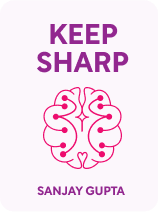

This article is an excerpt from the Shortform book guide to "Keep Sharp" by Sanjay Gupta. Shortform has the world's best summaries and analyses of books you should be reading.
Like this article? Sign up for a free trial here .
Is cognitive decline inevitable? Is there a way to slow down the rate of age-related cognitive impairment?
Just like any other organ, your brain’s health will inevitably decline with age. However, it’s not totally out of your control: You can slow down the rate of cognitive decline by stimulating your brain through learning and doing novel activities.
Here’s how to keep your brain healthy and active as you age.
Learning and Discovery
Keeping your brain active is a vital part of maintaining its health. Learning or discovering new things stimulates the brain, and this stimulation builds a brain more resistant to disease by creating new neural connections (and strengthening existing ones). With stronger neural connections, you are less susceptible to cognitive disruption. With a greater quantity of neural connections, you can offset the disruption through the use of the other networks. This may be how some people whose brains show all the physical signs of Alzheimer’s don’t manifest any symptoms of the disease.
| Can the Brain’s Adaptability Be Harmful? Gupta argues that increasing neural networks through learning can help the brain offset disrupted communications. This neuroplasticity is a vital function, but some suggest that it can also have harmful long-term implications, especially when related to a brain injury. After a head injury, the brain can rewire itself to maintain the connection between two regions of the brain. In the short term, this is extremely beneficial, as the brain can keep performing at a high level after sustaining damage. In the long-term, however, it may be harmful. Neural networks are usually designed to be as efficient as possible. When alternative routes are used, the brain may use more energy and be less efficient. In other words, it may take your brain slightly more time and energy to process and transmit information. Over time, the consistent use of more energy in the brain may lead to neurological disorders, such as Alzheimer’s. |
Ways to Stimulate the Brain
Gupta says that the best way to stimulate the brain is through challenging and novel activities. Doing this will increase the brain’s ability to adapt to damage or other challenges (or what scientists call your “cognitive reserve”). When many people think of brain stimulation, they think of brain games or puzzles. While these are helpful for working memory, they aren’t as beneficial for things like problem-solving or reasoning, which are also a big part of cognitive reserve. For this reason, you are much better off taking a class on something you enjoy, learning a language, or doing some other complex skill that gets you out of your comfort zone.
| How to Keep Your Brain Healthy and Active: Tips for Stimulating the Brain As Gupta indicates, many activities can stimulate the brain—like learning a new language or visiting a museum. However, stimulating the brain isn’t a one-time thing: We develop cognitive reserve through a lifetime of learning and curiosity. Gupta’s tips for stimulating the brain are a good start, but to keep the momentum going, seek out activities with the following characteristics that have been shown to increase cognitive reserve: Slightly challenging: Perform tasks that are difficult and challenging without being frustrating. These are great for your brain and strengthen neural connections. Absorbing: Seek out tasks in which you feel actively engaged and interested for maximum benefit. Varied: To make sure you’re growing new neural connections, mix up activities periodically. |

———End of Preview———
Like what you just read? Read the rest of the world's best book summary and analysis of Sanjay Gupta's "Keep Sharp" at Shortform .
Here's what you'll find in our full Keep Sharp summary :
- The steps you can take to prevent cognitive decline such as Alzheimer’s
- How to keep your brain strong and resilient throughout your life
- Foods to eat and avoid to maintain brain health






